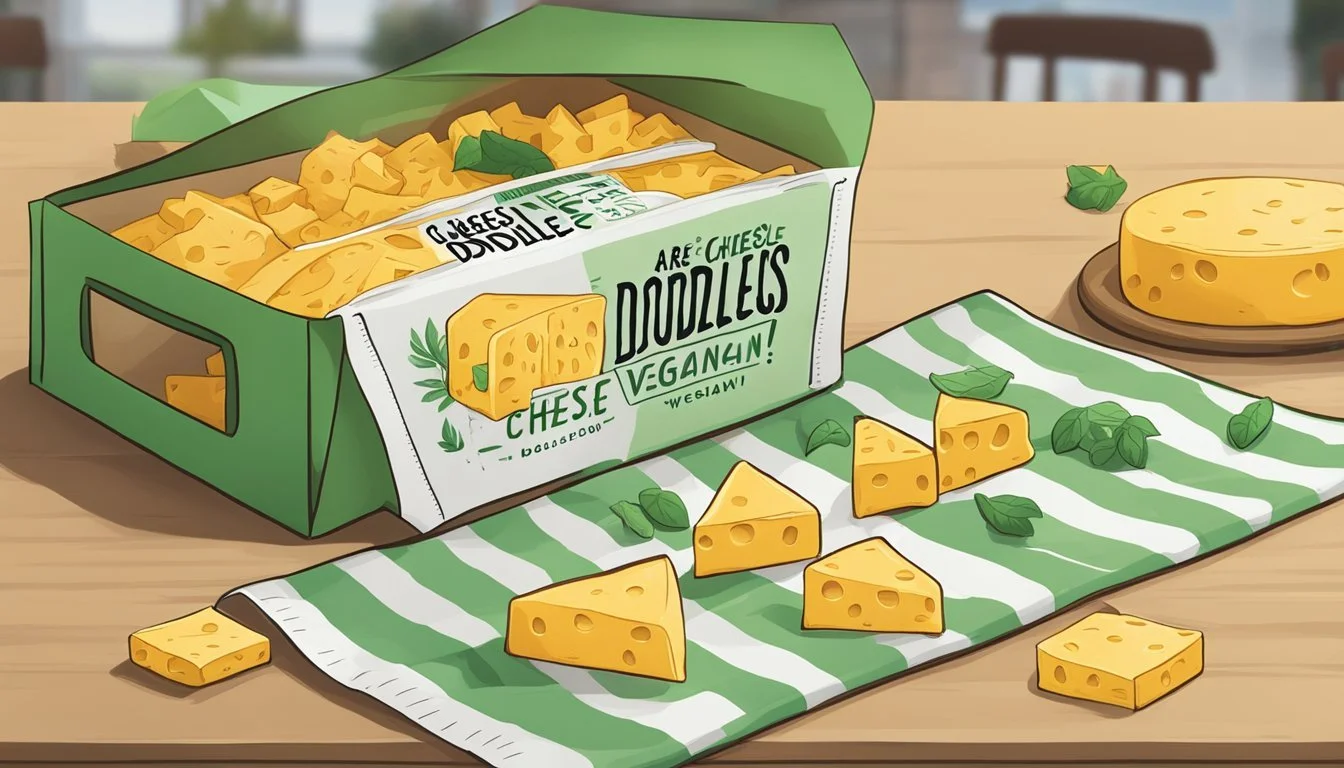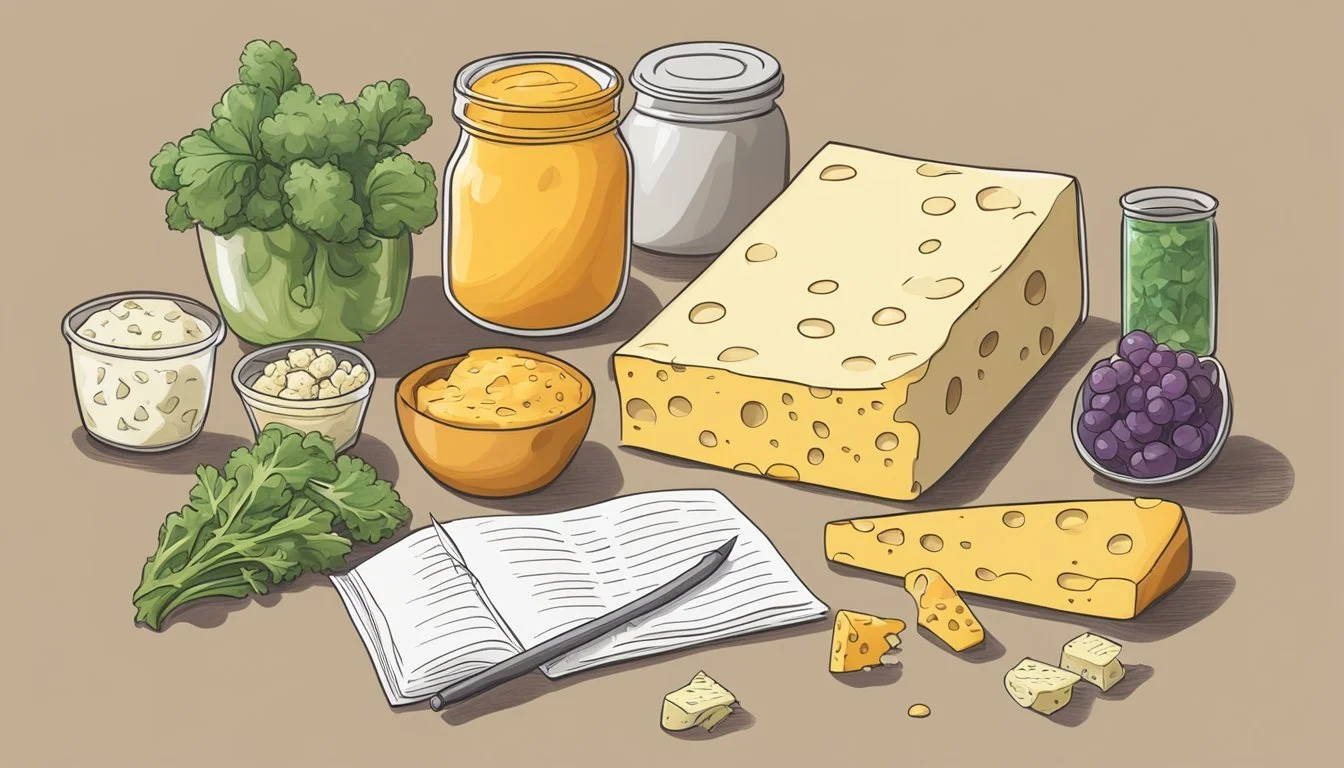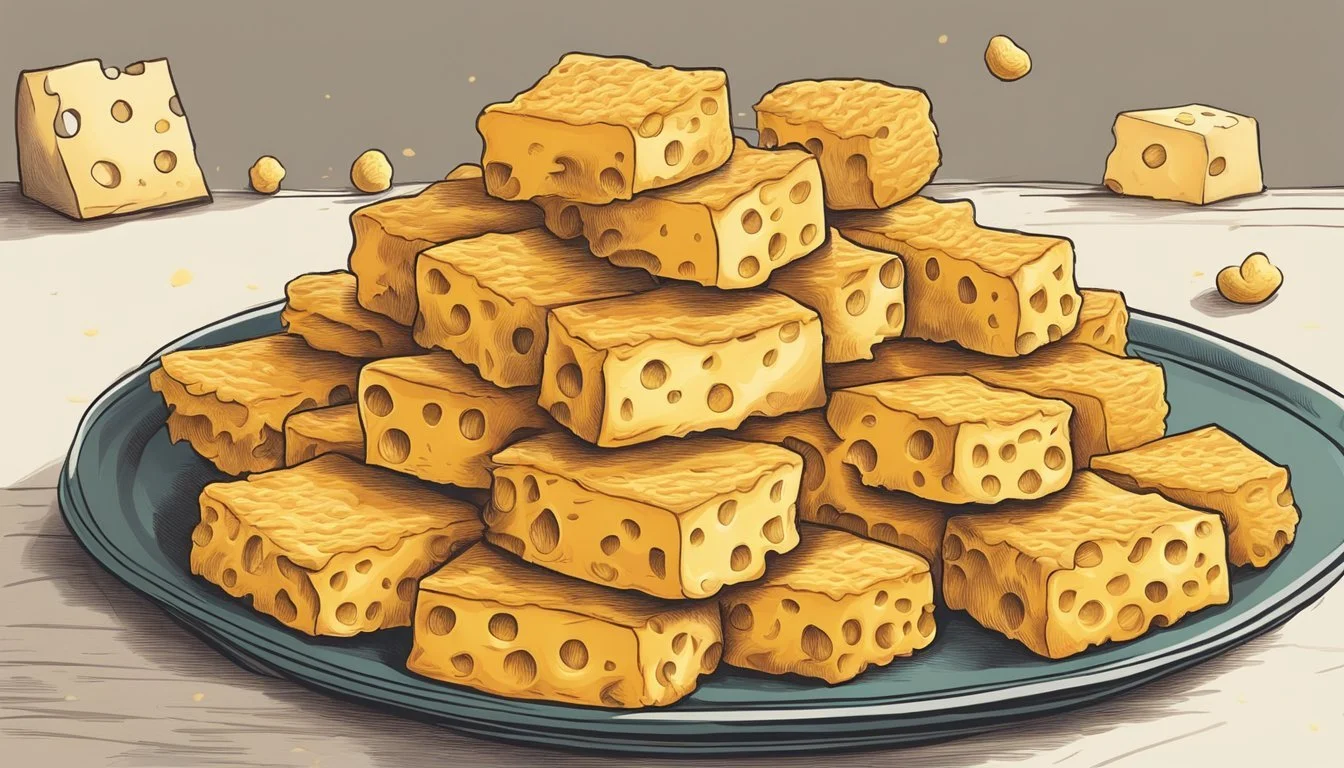Are Cheese Doodles Vegan?
Unveiling the Truth About This Popular Snack
Cheese (What wine goes well with cheese?) Doodles, the popular puffed corn snack known for its crunchy texture and cheesy flavor, have traditionally been made with dairy cheese, making them unsuitable for a vegan diet. However, with the rise of plant-based eating, some brands have started producing vegan Cheese Doodles. These vegan versions replace dairy cheese with plant-based ingredients to create a snack that maintains the distinctive taste and texture of traditional Cheese Doodles while being free from animal products.
Vegan Cheese Doodles are made using various alternative protein sources such as chickpeas, which not only mimic the texture but also provide nutritional benefits. They are commonly lower in fat and calories and are often free from common allergens like gluten. The innovation in producing vegan Cheese Doodles has provided a cruelty-free option for those following a vegan lifestyle or for consumers looking for a healthier snack alternative.
The market offers a selection of brands that have successfully recreated the Cheese Doodle experience without the use of dairy. These products often boast a high fiber and protein content, satisfying the demand for vegan snacks that do not compromise on the savory, cheesy essence that Cheese Doodles are renowned for. As a result, vegan Cheese Doodles have become a growing segment in the snack industry, reflecting the evolving consumer demands for plant-based and allergen-friendly foods.
Overview of Cheese Doodles
Cheese Doodles are an iconic snack that combines a distinctive cheesy flavor with a satisfying crunch. They are recognized across generations for their texture and taste.
Historical Background
Cheese Doodles, often referred to as cheese puffs, emerged as a popular snack in the 1940s. They are a product made by extruding heated corn dough through a die that gives them their unique texture. Once expelled, the doodles are baked or fried and then coated with a cheese-flavored powder. Their invention is often attributed to the Flakall Corporation of Beloit, Wisconsin, and the snack has since become a staple in American snack food culture.
Popularity and Cultural Significance
Since their inception, Cheese Doodles have gained immense popularity and have become a cultural icon in the United States. They are commonly enjoyed on various occasions, from casual gatherings to major events. The snack has even been celebrated annually on National Cheese Doodle Day, observed on March 5th. Cheese Doodles are not only a favorite among children but have also maintained their appeal to adults, making them a cross-generational delicacy. The enduring popularity of Cheese Doodles can be attributed to their puffy, light texture, and tangy, cheesy flavor, which have made them a beloved snack for many years.
Vegan Diet Fundamentals
In exploring the compatibility of cheese doodles with a vegan diet, it is crucial to understand the fundamentals of veganism. This includes a clear definition of what constitutes a vegan diet and an awareness of the typical ingredients that vegan products contain.
Defining Veganism
Veganism is a dietary and lifestyle choice that abstains from the use of animal products. This extends to a wide range of areas, including food, clothing, and other goods. In terms of diet, vegans exclude all animal-derived products, which encompass meat, dairy, eggs, and honey. A vegan diet focuses on plant-based foods and ingredients, advocating for a lifestyle that seeks to minimize harm to animals.
Common Ingredients in Vegan Products
When it comes to vegan products, the use of plant-based ingredients is key. These are some common components found in vegan-friendly food items:
Proteins: Sources such as legumes (beans, lentils, chickpeas), soy products (tofu, tempeh), and seitan. (What wine goes well with seitan?)
Dairy substitutes: Plant milks (almond, soy, oat), vegan cheeses, and yogurts made from nuts and plant sources.
Sweeteners: Natural plant-derived sweeteners like maple syrup and agave nectar as alternatives to honey.
Fats: Oils from plants, seeds, and nuts, including olive oil, coconut oil, and avocado.
In vegan food production, these ingredients replace animal-derived components, offering a dairy-free and animal product-free alternative that aligns with the vegan ethos. Vegan cheese, for example, may utilize nutritional yeast, nuts, and thickening agents to achieve a cheese-like flavor and texture without the use of animal milk.
Ingredients Analysis
When examining whether Cheese Doodles are vegan, one must scrutinize the individual ingredients, focusing particularly on those that impart the cheesy flavor and the specific vegan alternatives used to replace non-vegan components.
Non-Vegan Ingredients
Cheese: Traditional Cheese Doodles often contain real cheese, which is derived from milk, making them unsuitable for vegans.
Lactic Acid: Sometimes derived from dairy sources, lactic acid can add a tangy taste to snacks, thus questioning their vegan status.
Protein: Animal-based protein, if present, disqualifies a snack from being vegan.
Vegan Alternatives in Snacks
Vegan Cheese Flavoring: Snacks like OLW Cheez Doodles Vegan utilize plant-based ingredients to replicate the cheesy flavor without animal products.
Oil: Sunflower oil is a common vegan ingredient used in snacks for cooking and texture enhancement.
Puffed Corn: The base of many cheese-flavored snacks is puffed corn, which is inherently vegan.
Salt and Maltodextrin: These are vegan-friendly ingredients that contribute to taste and texture.
Health and Nutrition
In assessing the health and nutrition of Cheese Doodles, it is essential to consider their nutritional content and how they compare to healthier alternatives that could cater to dietary preferences or restrictions.
Nutritional Content
Cheese Doodles typically provide energy primarily through carbohydrates and fats, with a limited amount of protein. They often carry saturated fats due to the cheese and oil content. The snack generally lacks significant amounts of fiber and vitamins, positioning them as more of an indulgence than a healthful choice.
Saturated Fats: Varied in content based on the brand, but usually present
Fiber: Minimally present
Vitamins: Generally not a notable source
Comparing Healthier Alternatives
Healthier alternatives to traditional Cheese Doodles have entered the market, including those suitable for gluten-free, grain-free, and paleo diets. These versions often incorporate ingredients like cassava flour, coconut flour, and nutritional yeast to improve their nutritional profiles.
Gluten-Free and Grain-Free Alternatives: Use cassava and coconut flours
Paleo Options: Exclude grains and dairy; use alternative sources for cheesiness, such as nutritional yeast, providing a cheese flavor with the benefit of B-vitamins
Saturated Fats: Reduced in healthier alternatives; often use healthier oils
Fiber Content: Typically higher in alternatives that use bean flours or vegetable ingredients
Cheese puff snacks marketed as healthier often emphasize their protein content from plant-based sources and may boast lower levels of saturated fats. They may also avoid certain ingredients like palm oil, aligning them with more sustainable and health-conscious choices.
Are Cheese Doodles Vegan?
Traditional Cheese Doodles are typically not vegan, as they contain dairy products used for their cheesy flavor. This restricts vegans and those avoiding animal products from indulging in this popular snack. However, some brands have recognized this gap and introduced plant-based alternatives.
Examining Cheese Doodles for Vegan Compliance
Cheese Doodles, the crunchy corn puffs known for their cheesy taste, traditionally include cheese and other animal-derived ingredients. For vegans, the presence of cheese, which is made from animal milk, is a clear non-compliant factor. Vegan consumers must carefully scrutinize ingredients lists for no cheese and ensure that plant-based ingredients are used instead of any animal products.
Brand-Specific Vegan Varieties
OLW, a snack brand, has introduced a product to cater to the growing demand for vegan snacks: OLW Vegan Cheez Doodles. These are specifically crafted to be free from animal products, utilizing plant-based ingredients to imitate the traditional cheese flavor. Consumers can look for these kind of brand-specific vegan varieties to ensure that their dietary preferences are met without compromising on taste.
Taste and Texture Profile
This section examines the specifics of what makes Cheese Doodles a sensory delight, and looks at how vegan versions stand up in terms of flavor and texture.
Sensory Experience of Cheese Doodles
Cheese Doodles are renowned for their distinct texture and robust cheesy flavor, which deliver a gratifying crunch on every bite. The sensory experience is a combination of texture and flavor that tickles the taste buds. Typically, these puffed or extruded corn snacks are coated with a seasoning blend that includes cheese, creating the classic cheesy flavor that Cheese Doodles are known for. In addition to cheese, taste components often include elements like onion, garlic, and sometimes a hint of sugar to balance the flavor profile.
Vegan Alternatives and Flavor
When it comes to vegan alternatives, manufacturers strive to replicate the iconic taste and texture with plant-based ingredients. Vegan Cheese Doodles challenge the traditional palate by substituting dairy with nutritional yeast or other vegan flavoring agents that mimic the cheesy taste. Although the primary taste is designed to be cheesy, these alternatives may incorporate a variety of spices to enhance the flavor and create a complex profile that appeals to those seeking a plant-based snack. Vegan Cheese Doodles aim to satisfy similar textural expectations, delivering a crunchy experience that vegans and non-vegans alike can enjoy.
Varieties and Alternatives
Cheese Doodles, with their quintessential crunch and cheesy flavor, offer multiple variants catering to diverse taste preferences and dietary restrictions. Within these variants, there are also satisfactory vegan snack alternatives that align with plant-based diet principles.
Cheese Doodle Variants
Cheese Doodles are traditionally made with cornmeal and cheese flavoring, available in different forms like cheese curls and cheese balls. These variants can come in various sizes, from small bite-sized pieces to larger, chunkier versions that offer a more substantial crunch. Packaged in bags, cheese doodles generally are not vegan due to their cheese content; however, some brands have developed vegan-friendly versions.
OLW Vegan Cheez Doodles is one such product, which replicates the cheesy taste using plant-based ingredients. These vegan cheesy snacks are not only a guilt-free indulgence for those following a vegan diet but also contribute to a more sustainable snack option by significantly reducing the CO₂ footprint.
Vegan Snack Alternatives
For vegans seeking substitutes for cheese-flavored snacks like Cheese Doodles, the market offers a variety of options that mimic the cheesy flavor and satisfying crunch using vegan ingredients.
Plant-Based Cheesy Snacks:
Chickpea Puffs (e.g., Hippeas): High in protein and fiber, these are an excellent alternative made from chickpeas, coming in a range of flavors, one of which replicates the cheesy taste sensation.
Vegetable Chips: Made from various vegetables like kale or sweet potatoes, they offer a crunchy texture and are often seasoned to achieve a cheesy flavor profile.
Homemade Vegan Cheesy Seasoning:
Nutritional Yeast: A typical base for vegan cheese flavor, it's often blended with nuts like cashews to create a dairy-free cheesy sprinkle suitable for popcorn or homemade snacks.
In selecting vegan alternatives, one should look for the keywords "plant-based", "dairy-free", or specific mentions of being suitable for vegans to ensure the product meets dietary preferences.
Consumer Considerations
When selecting vegan cheese doodles, consumers should meticulously scrutinize labels for ingredients and allergen information to ensure the product meets their dietary requirements and allergy considerations.
Label Reading and Ingredients
One must carefully read labels to identify non-GMO and vegan ingredients. For instance, traditional cheese doodles typically contain dairy products. In contrast, vegan cheese doodles may use plant-based alternatives like nutritional yeast or vegetable oils to replicate the cheesy flavor. Keeping an eye out for certifications such as Vegan Action or Non-GMO Project Verified can also provide assurance about the contents and production processes involved. Here's a basic outline for label inspection:
Ingredients: Look for plant-based components often found in vegan cheese snacks.
Certifications: Check for vegan and non-GMO labels.
Production: Consider statements referring to eco-friendly or sustainable production methods.
Allergen Information
Allergens are a crucial consideration for consumers. It's important to check for any allergens that could be present either as ingredients or due to cross-contamination during production. Common allergens to be aware of in vegan products include nuts, soy, and gluten. Manufacturers must disclose these allergens, typically at the end of the ingredient list or in a separate section that states, "Contains" or "May contain." A brief checklist includes:
Primary Allergens: Look for key allergens stated within the ingredient list.
Cross-Contamination: Review any notes regarding potential allergen exposure during manufacturing.
Dedicated Facility: A notation that a product is made in a dedicated facility is reassuring for allergen concerns.
Environmental and Ethical Aspects
When examining the environmental and ethical aspects of Cheese Doodles, one must consider both the sustainability of production and the ethical implications of snack choices. The focus on these dimensions reflects a growing consumer interest in how snack foods impact the planet and society.
Sustainable Production
Cheese Doodles, traditionally cheese-flavored puffed corn snacks, face scrutiny regarding their environmental footprint. In cases like OLW's Vegan Cheez Doodles, the brand has made strides by reducing their CO₂ emissions by 50% through new production methods and packaging. This signifies a shift towards more sustainable snacking options where environmental costs are increasingly considered. The specifics of these methods include:
Resource Optimization: More efficient use of water and energy in production processes.
Eco-Friendly Packaging: Adoption of biodegradable or recyclable materials to reduce waste.
Ethical Choices in Snacking
From an ethical perspective, the choice to consume vegan Cheese Doodles aligns with avoiding animal exploitation. Vegan Cheese Doodles do not require animal products, which addresses concerns about the welfare of animals used in traditional dairy-centric snacks. Their production typically involves less exploitation of natural resources, which can be seen as a more responsible and ethical choice. Key ethical considerations include:
Animal Welfare: Vegan products ensure no animals are harmed for ingredients.
Health Implications: Often perceived as a healthier choice, lacking animal fats.
By opting for snacks such as vegan Cheese Doodles, consumers make a conscious decision to support ethical practices while also potentially benefiting their own health.










